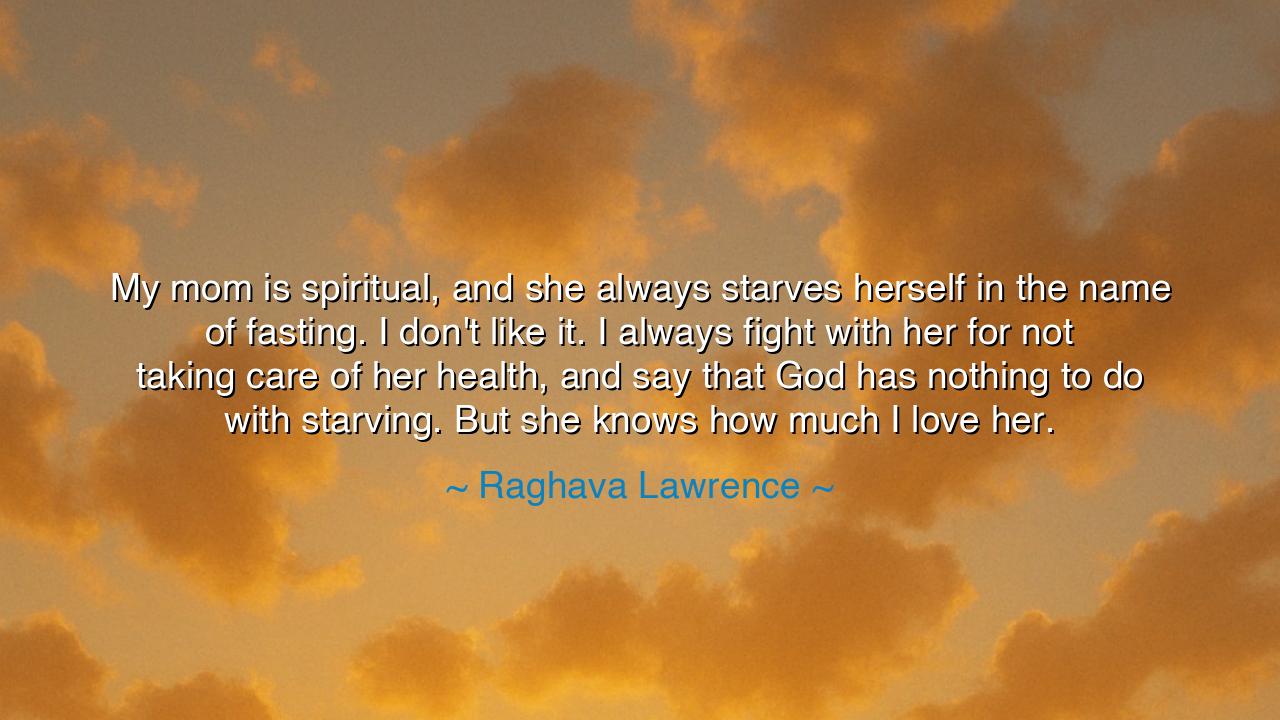
My mom is spiritual, and she always starves herself in the name
My mom is spiritual, and she always starves herself in the name of fasting. I don't like it. I always fight with her for not taking care of her health, and say that God has nothing to do with starving. But she knows how much I love her.






There are few bonds as sacred and eternal as that between a mother and her child. In his tender and heartfelt words, Raghava Lawrence speaks not as a celebrity, but as a son who loves deeply and fears greatly: “My mom is spiritual, and she always starves herself in the name of fasting. I don't like it. I always fight with her for not taking care of her health, and say that God has nothing to do with starving. But she knows how much I love her.” Beneath these simple words lies a universe of emotion — love entwined with worry, faith clashing with reason, and the timeless struggle between devotion and care. His statement, though born of personal experience, reflects a truth as old as humanity itself: that love must walk the fine path between reverence and protection, between letting go and holding close.
In this quote, we see two forms of devotion meeting at a crossroads. The mother’s devotion is upward — directed toward the divine, expressed through fasting, sacrifice, and faith. The son’s devotion is earthbound — directed toward his mother herself, expressed through concern and care. Both forms are sacred, yet they conflict. The mother seeks closeness to God, believing that her suffering sanctifies her soul. The son seeks to keep her close to life, believing that the divine would never demand the destruction of the body that it created. Thus, between them stands the eternal question: how do we serve both faith and love without wounding either?
The ancients, too, wrestled with this question. In the great epic of The Mahabharata, we find the story of Bhishma, who took a vow of lifelong celibacy to serve his father’s happiness. His vow was noble, but it brought suffering — not only to himself but to the generations that followed. In his devotion, Bhishma forgot that duty to one’s self is also duty to the divine. Like Raghava Lawrence’s mother, his sacrifice was holy in intent but harsh in effect. And like Lawrence himself, those who loved Bhishma watched helplessly as devotion became self-denial. The story teaches us that God does not demand suffering, but sincerity — that the highest form of worship is balance, not torment.
The origin of Lawrence’s words lies in this deeply human conflict between faith and affection. His mother’s fasting springs from a heart filled with devotion — a practice woven into centuries of Indian tradition, where fasting is seen as purification of both spirit and body. Yet Lawrence’s protest is equally sacred, for it arises from love and compassion. In his eyes, faith without self-care is a misunderstanding of divinity. For how can one worship the Creator while neglecting His creation? Thus, his resistance is not rebellion, but reverence — a son’s plea for wisdom over ritual, for understanding over blind endurance.
And yet, in his final words, “But she knows how much I love her,” the conflict softens into peace. Here lies the most beautiful truth of the quote: love does not always require agreement; it requires understanding. He cannot change his mother’s faith, nor she his concern. But their hearts recognize each other. She knows his anger is born of care, and he knows her fasting is born of belief. Between them flows an unspoken grace — the divine that dwells not in temples or rituals, but in the space where two souls forgive each other’s differences.
This story, though personal, carries a lesson for all who hear it. Faith and reason are not enemies; they are siblings in the same household of the spirit. True faith must not destroy the body, for the body is the vessel of all good works. And true reason must not mock devotion, for belief gives meaning to life. The wise, therefore, must walk the middle path — honoring the heart’s yearning for the divine while protecting the body that allows it to serve. For in the balance of both lies wholeness.
So, let these words be a guide: love those who believe differently, and protect them even when they refuse your care. Speak your truth, but speak it with tenderness. Remind them, as Lawrence reminds his mother, that God has nothing to do with suffering, and everything to do with love. In a world that often mistakes endurance for holiness, be the one who reminds others that compassion, not pain, is the highest form of prayer. For in the end, it is not fasting or fighting that sanctifies us — it is love itself, eternal and divine, that redeems both faith and flesh alike.






AAdministratorAdministrator
Welcome, honored guests. Please leave a comment, we will respond soon